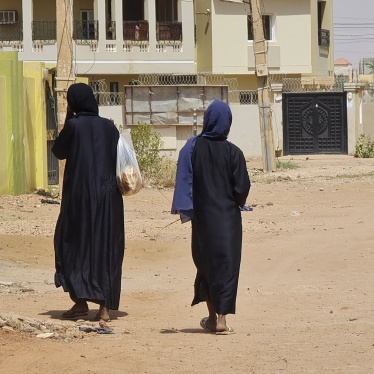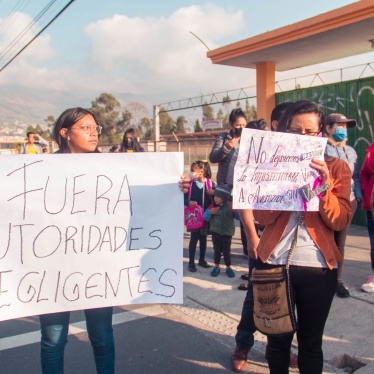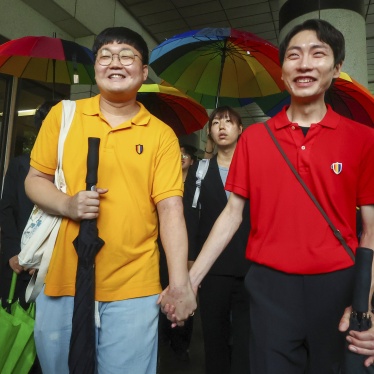Philip Gordon
Assistant Secretary of State for Europe and Eurasia Affairs
RE: Human Rights Watch Concerns in Armenia, Azerbaijan, and Georgia
Dear Secretary Gordon,
We are writing in advance of your forthcoming trips to Armenia, Azerbaijan, and Georgia, which we believe provide important opportunities for raising key human rights concerns with the respective governments. Below we outline our main concerns in each country as well as recommendations for bringing each government's human rights record in line with its international commitments.
Armenia
Human Rights Watch concerns about Armenia include election-related violence, post-election protests and violence, ill-treatment in custody, lack of accountability for excessive use of force and police abuse, and deteriorating media freedoms.
Incumbent Prime Minister Serj Sargsyan won the February 19, 2008 presidential elections with 52.8 percent of the vote, defeating the opposition candidate Levon Ter-Petrossian (21.5 percent). However, the elections were marred by violence and irregularities. Immediately following the elections, Human Rights Watch documented nine cases of assailants intimidating, threatening, and even violently attacking opposition party activists, journalists, and observers.
Opposition supporters who claimed that Sargsyan's victory was the result of fraud began a continuous protest immediately after the election, with daily rallies and an overnight encampment on a city-center square. The authorities initially tolerated the protesters. However, on March 1, special police forces confronted them. As a result of clashes between protesters and police, at least eight protesters and two police officers died, and scores were injured. While, in some instances, the use of force may have been legitimate (such as in response to a small group of violent protesters), in many others it was excessive.
In the aftermath of the violence there were more than 100 arrests. Human Rights Watch documented physical abuse and ill-treatment of detainees during their arrests as well as while they were being transported to the police department. In some cases, both verbal and physical abuse continued in police custody. We have documented 38 detention cases, in 27 of which the detainees alleged ill-treatment. We have also documented serious due process violations, including incommunicado detentions and lack of access to a lawyer of one's choosing.
The authorities' response to the March 1 events has focused on identifying and prosecuting those responsible for organizing the demonstrations and on prosecuting others for participating in "violent" disorder. The government prosecuted more than 50 civilians on charges arising from the demonstrations and sentenced some to lengthy prison terms. Six opposition leaders are currently on trial in Yerevan proceedings which appear to be politically motivated.
The government has acknowledged to Human Rights Watch that "mistakes were made" by police on March 1. The police department has dismissed several top officials, though on grounds not directly connected with police conduct on March 1. Officials claim to have opened 200 internal inquiries into this conduct, but as of end March 2009 none have been completed. The parliamentary commission charged with investigating the March 1 events appears stalled.
In June 2008 the European Court of Human Rights ruled that Armenia had violated Article 10 of the European Convention on Human Rights (guaranteeing freedom of expression) in relation to its regulation of the independent broadcast company A1+. The court held that laws regulating the awarding of broadcast licenses failed to protect against arbitrary government interference and that denials of a license to A1+ were unlawful. Despite this, as of April 2009, A1+ had made 12 unsuccessful attempts to regain a license since going off air in 2002. In September 2008, the National Assembly amended the law on television and radio to suspend all licensing until a digital switchover scheduled for 2010 occurs. The amendments are seen as further efforts to deny A1+ a license.
Human Rights Watch received reports of violence against the opposition and independent journalists during the most recent municipal elections in Armenia. Several journalists were prevented from reporting because their access to polling stations was blocked.
The United States government should press the Armenian leadership to:
- Conduct a thorough, independent and transparent investigation into the excessive use of force by police on March 1, 2008 and into ill-treatment of detainees by police officials during the subsequent arrests and detentions. Such an investigation should comply with international standards and be capable of leading to the prosecution of abusive law enforcement officials;
- Adopt legislation that requires all law enforcement agents, including riot police and members of the special forces, to wear some kind of identification or insignia;
- Adopt legislative amendments granting unimpeded access to a lawyer of one's choice from the moment of detention;
- Implement all outstanding recommendations from the reports of the Office for Democratic Institutions and Human Rights of the Organization for Security and Co-operation in Europe (OSCE/ODIHR) on its observation of Armenian elections, including its final report on the February 19, 2008 presidential election;
- Lift restrictions on the media and ensuring a diversity of viewpoints in print and electronic media;
- Implement the European Court of Human Rights judgement finding the government's denial of a license to A1+, an independent broadcasting company, a violation of Armenia's human rights obligations.
Azerbaijan
We are particularly concerned about the deterioration of media freedoms in Azerbaijan. Other core concerns include harassment and intimidation of human rights defenders, violations of freedom of assembly, politically motivated arrests and prosecutions, and torture in police custody.
Journalists and media professionals in Azerbaijan are frequently the targets of politically-motivated criminal charges. The government uses defamation and other such charges to intimidate independent and opposition journalists. Libel remains a criminal offense and carries harsh punishments, which range from large fines to up to three years' imprisonment. Fine payments often threaten the financial survival of media outlets. The government released two journalists in recent months, but at this writing a number of journalists remain in prison on politically-motivated criminal charges:
- The government has subjected Eynulla Fatullayev, an outspoken critic of the government and editor-in-chief of two newspapers, to a long series of criminal prosecutions in retaliation for his writings. In September 2006, Fatullayev received a two-year suspended sentence and was ordered to pay damages in three criminal defamation cases brought by the minister of the interior. In April 2007, he was again convicted of criminal libel and insult and sentenced to two-and-a-half years in prison for an internet posting he denied having written. A third case against him was brought in October 2007, this time on charges of terrorism, inciting ethnic hatred, and tax evasion, resulting in a prison sentence of eight and a half years. The terrorism charges are based on an article Fatullayev wrote criticizing the government's foreign policy. Both newspapers were closed down after the Ministry of National Security official evicted the staff and seized their property.
- Ganimed Zahidov, Azadlig editor-in-chief, was sentenced to four years in prison in March 2008 on questionable hooliganism charges. Zahidov often criticized high-ranking government officials and as a result was subjected to harassment, threats, attacks, and numerous lawsuits against him and his newspaper, resulting in fines equal to hundreds of thousands of US dollars.
- The journalist Mushfig Husseinov is serving five years in prison and also has been barred from practicing journalism for two years on questionable extortion charges.
- o Novruzali Mammadov, a newspaper editor and academic, was sentenced to 10 years in prison in June 2008 on high treason charges stemming from his writing about abuses committed against minorities by the Azerbaijan government. After more than 16 months in pretrial detention, he was convicted of "distribution of Talysh nationalist ideas," "attempts to destroy the foundations of the Azerbaijani state," and spreading "a negative image of Azerbaijan" internationally.
- The Azerbaijani government has also failed to conclusively investigate numerous reports of violence and threats of violence against opposition and independent journalists. According to a media-monitoring NGO in Azerbaijan, in 2008 alone, there were 49 incidents involving verbal or physical assaults on journalists, compared with 41 cases in 2007. Investigations were launched in only 11 cases, and only one case resulted in prosecution.
Emin Huseynov, who is chair of the Institute for Reporter Freedom and Safety and one of Azerbaijan's top media freedom activists, was beaten by police in custody last summer, but the government refused to investigate.
The government also impedes the work of foreign radio and TV. In November 2008, the government announced the discontinuation in 2009 of the local transmission of three international radio services-BBC, Radio Free Europe/Radio Liberty, and Voice of America-making them accessible only through satellite receiver or the internet.
The government continues to hold a number of political prisoners, prompting the Council of Europe Parliamentary Assembly in March 2009 to appoint a rapporteur on the issue of political prisoners in Azerbaijan. Government officials, businessmen, and opposition politicians arrested prior to the November 2005 parliamentary elections on allegations of attempting to overthrow the government remain in custody. Parts of their trials were completely closed, and lawyers complained of procedural violations and raised concerns about the trials' fairness.
Torture and inhuman, degrading treatment in state custody are widespread in Azerbaijan and occur with impunity. The following case is illustrative:
- Three teenage boys - Ruslan Bessonov, Maksim Ganashilkin, and Dmitri Pavlov - were convicted of murder in June 2007. At trial, they repeatedly stated that the confessions and incriminating statements which were the basis of their convictions had been coerced under severe beatings and other forms of torture. The government failed to conduct a meaningful investigation into these and other allegations of abuse.
The United States government should press the Azerbaijan leadership to:
•· Immediately and unconditionally release all journalists who remain in prison on politically motivated charges;
- Repeal the criminal libel law. Civil remedies with a reasonable monetary cap, not criminal prosecutions should be available in cases of libel;
- Conduct effective investigations into all incidents of violence or threats of violence against journalists;
- Ensure media diversity in Azerbaijan by repealing the impediments to foreign broadcasting;
- Investigate the closure of Realny Azerbaijan and Gundelik Azerbaijan and release their property;
- Publicly condemn harassment of civil society members and thoroughly investigate all physical attacks against human rights defenders;
- Investigate the police violence against IRFS chairman Emin Huseynov and hold the perpetrators accountable;
- Initiate an independent review, with the involvement of international observers, of all cases of political prisoners, with a view to releasing all those wrongfully imprisoned.
Georgia
Our concerns in Georgia fall into the following categories: indiscriminate and disproportionate attacks during the August 2008 armed conflict over South Ossetia; attacks on demonstrators during opposition rallies in the capital Tbilisi; lack of accountability for the excessive use of force by law enforcement officials; and criminal justice reforms that violate human rights standards.
During military hostilities in South Ossetia, Georgian forces conducted indiscriminate attacks, firing Grad multiple rocket launchers-a weapon that is indiscriminate when fired at civilian-populated areas-into Tskhinvali, the capital of South Ossetia, and outlying areas. They did this at a time when civilians still remained in those areas. The Georgian military used tanks and machine guns to fire at buildings in Tskhinvali. While South Ossetian forces were firing on Georgian military forces from at least some of these buildings, civilians were still taking shelter in some of the buildings which under attack, raising concerns of indiscriminate attacks which caused disproportionate harm to civilians. For a more detailed analysis, please see Human Rights Watch's January 2009 report "Up in Flames," on human rights and humanitarian law violations committed during and in the aftermath of the conflict over South Ossetia.
The Georgian military used cluster munitions against Russian forces in South Ossetia. Although Human Rights Watch did not research whether humanitarian harm was done by these weapons, it documented an unusually high number of unexploded cluster submunitions that fell short of the weapon's minimum range in nine villages south of the South Ossetian administrative border. Four civilians were killed and eight were injured in this area of Georgia as a result of the use of cluster munitions; most of the deaths were caused by explosive duds after the attacks. Available evidence suggests that a massive failure of the weapons may have caused Georgian submunitions not to reach their intended targets in South Ossetia. Regardless of whether the weapons functioned or failed, their use illustrates that cluster munitions are always highly dangerous and cause unacceptable humanitarian harm. For more please see Human Rights Watch's April 2009 report on Georgia and Russia's use of cluster munitions.
Human Rights Watch is also concerned about a number of physical attacks on opposition activists and demonstrators who have been engaging in the protests in capital Tbilisi since April 9, 2009. The ombudsman and human rights groups in Georgia have reported dozens of cases. Human Rights Watch documented nine cases of such violent attacks, which collectively appeared as a concerted effort to intimidate the demonstrators and prevent them from exercising their right to freedom of assembly. Detailed description of the cases documented by Human Rights Watch can be found in a letter sent to the authorities.
Human Rights Watch has also documented allegations of inhuman and degrading treatment of three young men in police custody on May 6, 2009, highlighting the need for accountability for abuses committed against civilians in police custody. The three men had also been participating in the opposition demonstrations.
Despite repeated calls from key international actors, including the Parliamentary Assembly of the Council of Europe (PACE), the Georgian government has refused to launch a comprehensive investigation into the events of November 7, 2007, when police used excessive force against largely peaceful political demonstrations in the capital, Tbilisi, resulting in at least 500 injured. Authorities initiated investigations into only a handful of cases of possible excessive use of force, but none has born any result.
The government has also failed to conduct a comprehensive investigation into the March 2006 operation to quell a riot in Tbilisi Prison No. 5, which left seven prisoners dead and dozens injured.
The United States government has been right to give credit to the Georgian authorities for desisting from deploying police force to break up the recent opposition demonstrations. This prevented the situation from escalating. But the Georgian government should not ignore other law enforcement issues that have arisen in the context of the demonstrations. These include the need to:
- Investigate promptly and thoroughly the attacks against opposition activists and demonstrators;
- Bring the perpetrators to justice and make clear that such politically motivated violence will be neither tolerated nor condoned;
- Investigate promptly and thoroughly the allegations of ill-treatment in police custody and bring the perpetrators to justice;
- Conduct a thorough, independent, impartial and transparent investigation into the dispersal of protestors on November 7 on Rustaveli Avenue, at Rike, and outside of Imedi television studios. A similar investigation should be conducted on the prison riot of March 2006;
- Encourage policing reform, such as legislation requiring all law enforcement agents, including riot police and members of the special forces, to wear identification;
- Provide all law enforcement agents with uniforms that include appropriate identification; and
- Train law enforcement personnel to always act in accordance with the UN Basic Principles on the Use of Force and Firearms by Law Enforcement Officials.
The Georgian government should also be urged to:
- Investigate and hold accountable members of the Georgian armed forces, regardless of rank, who are responsible for serious violations of international human rights and humanitarian law. The Georgian government has said that it cannot conduct a full investigation into indiscriminate or disproportionate attacks because the de facto South Ossetian authorities will not grant them access to do so. We hope you will convey to the Georgian government that it should investigate how the decision to use Grad rockets was made and to hold responsible those who ordered or are implicated as a matter of command responsibility in indiscriminate attacks. Such an investigation would not require access to South Ossetia.
Thank you for your attention to these concerns and with best wishes for a productive trip.
Holly Cartner
Executive Director
Europe and Central Asia Division
Tom Malinowski
Director
Washington Advocacy




